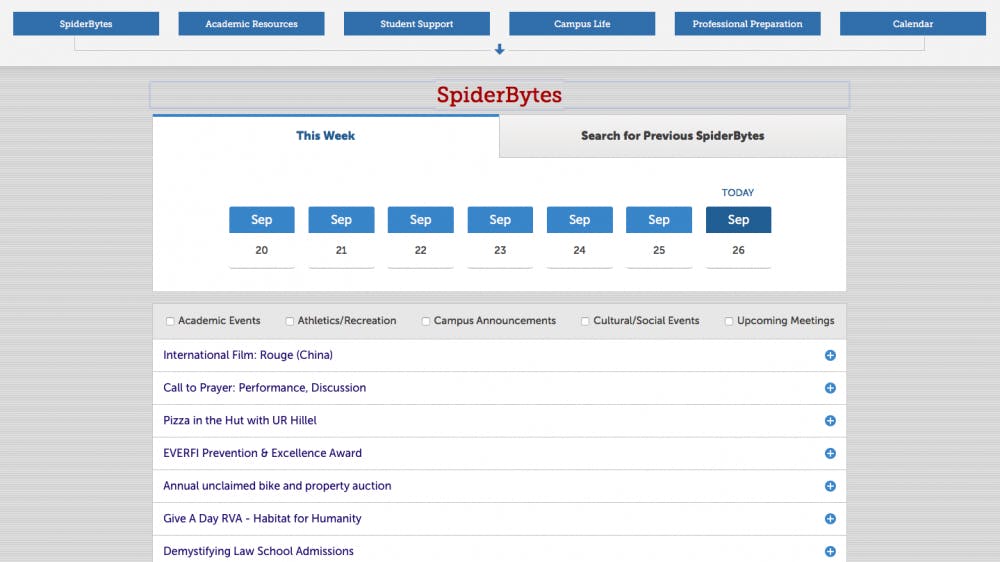Senior Christopher Cotter greeted students in the Heilman Dining Center on Wednesday night with a smile and a request for names and emails.
He was recruiting students who might be interested in participating in a global project called PURSUE, Preparing Undergraduates for Research in Stem-related fields Using Electrophysiology, which studies the electrical potentials in the brain and their relationship with sensory stimuli and motor responses.
This method of collecting student contact information might seem obsolete for today’s tech-savvy millennial, but it was the best option Cotter had since the project did not get participants from SpiderBytes, a campus information sharing service, as it used to before a recent change in SpiderBytes’ format.
SpiderBytes, formerly a daily email service with information about campus events and opportunities delivered to students and staff of the University of Richmond, now operates solely as a page on UR’s website. The change began this school year after the last SpiderBytes email delivered on Aug. 20.
Cynthia Price, director of media and public relations, said the format had changed because students had not been reading the emails.
“There was a history of SpiderBytes not being read,” Price said in an email. “To address this, SpiderBytes were embedded into audience-specific webpages, which further act as a centralized resource for our campus community.”
The change to SpiderBytes, combined with the new law that Virginia Gov. Ralph Northam signed in April prohibiting the release of students’ phone numbers and emails without their consent, made it hard for Cotter to find participants for the PURSUE project.
“I know that the university canceled SpiderBytes because not a lot of people looked at it, but the majority of our participants that we got for that, which is at least 70 to 80, were from that,” Cotter said. “I actually had to go out in person and get signatures for emails, especially since the new law is down. We don’t have a directory of emails, so it’s like we don’t have any way to contact students.”
Cotter said the creation of a webpage instead of daily emails was not a good way to address the problem of viewership.
“As far as I understand, the reason why SpiderBytes was taken out was because not enough students were reading it or not enough students had publicity to it,” Cotter said. “But the solution wouldn’t be to make it on a separate site where they’d have to actually do additional effort to go see it. I feel like that would decrease the amount because if it’s going to your email automatically every day, you’re much more likely to read it than if you have to go search for it.
"That solution, to me, didn’t seem like a solution.”
Michael Warchol, manager of communications and events for the Office of International Education, shared a similar frustration with Cotter because his office has had to change the way it promotes events to students and faculty. This change has involved more costly, unsustainable and time-intensive means, such as posters, flyers, stickers and banners.
Enjoy what you're reading?
Signup for our newsletter
“Personally, I’d like to see them come back,” Warchol said. “I know that there are some students who really did read them.”
Warchol also suggested the switch in the SpiderBytes format was not too popular among other faculty members.
“I haven’t really heard anyone say, ‘Wow I really like this new format,’” Warchol said. “I know with the university staff advisory council, they’ve received a number of questions and web submissions about what happened to SpiderBytes.”
Cotter said he missed SpiderBytes for the purpose of his project, as well as for his own access to new opportunities.
“I’ve gone to a lot of talks and a lot of keynote speakers that I wouldn’t have known unless I looked at SpiderBytes,” Cotter said. “Without SpiderBytes, it’s almost like you’re going to miss a lot of events that happen unless you know people who are directly involved with it, and I don’t think that’s very fair.”
Contact opinions editor Abby Seaberg at abigail.seaberg@richmond.edu.
Support independent student media
You can make a tax-deductible donation by clicking the button below, which takes you to our secure PayPal account. The page is set up to receive contributions in whatever amount you designate. We look forward to using the money we raise to further our mission of providing honest and accurate information to students, faculty, staff, alumni and others in the general public.
Donate Now



